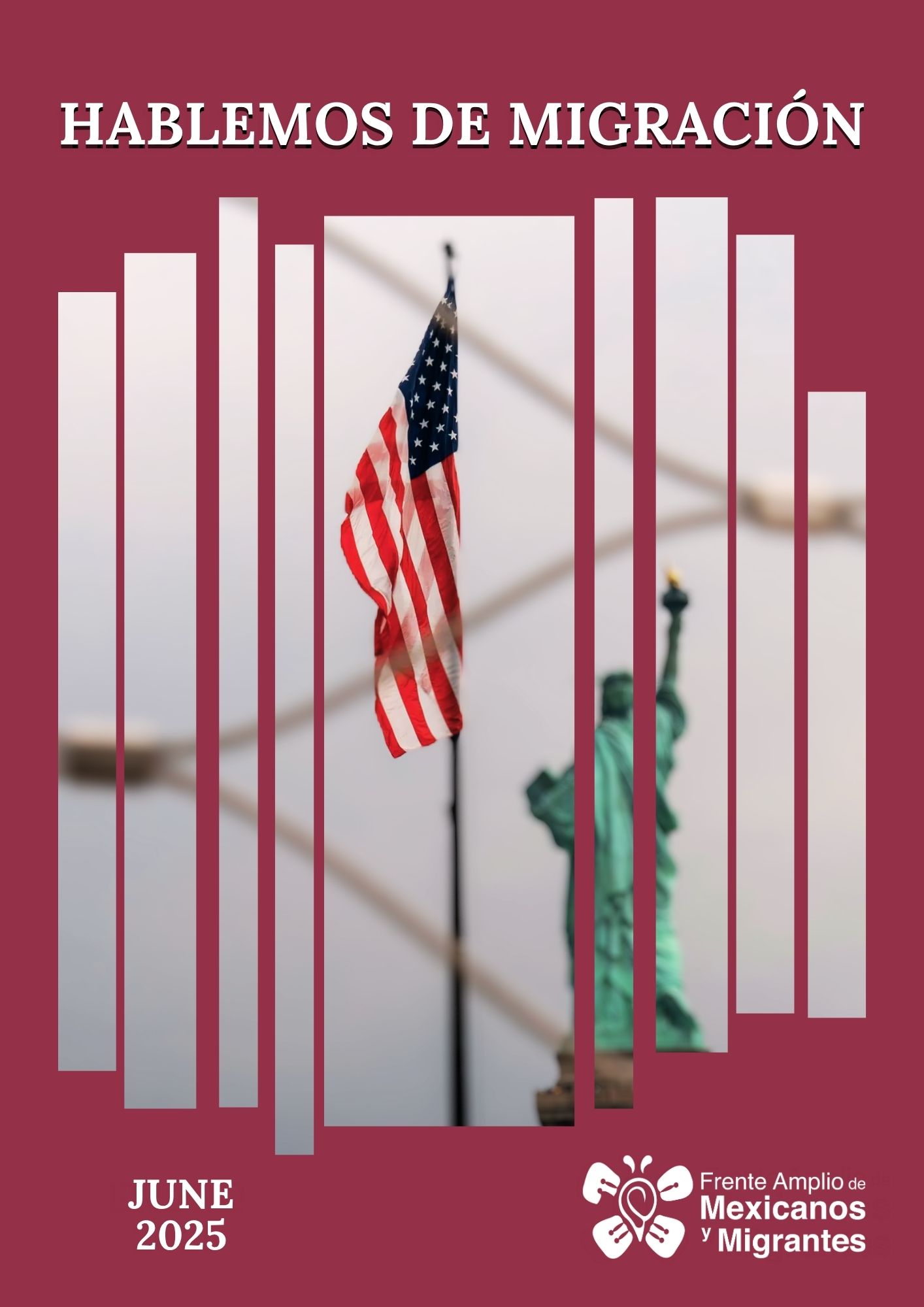LET’S TALK ABOUT MIGRATION
This editorial by Diego Torres appears as the introduction to the June 2025 issue of Hablemos de Migración, a newsletter on migration issues published by the Frente Amplio de Mexicanos y Migrantes. We encourage you to subscribe. The English version of the June 2025 issue is available for download.

To talk about migration, in the context of the xenophobic policies of Donald Trump’s government, implies not only criticizing the measures taken in the United States but also seriously looking at the structural causes that drive millions of people from their home countries. It is not enough to denounce the hatred of a charismatic leader who, taking advantage of a population mired in a prolonged economic crisis, has led them to believe that migrants are responsible for all their woes.

To talk about migration is to question measures like the proposal to impose taxes on remittances. This attack directly affects countries like Mexico, Guatemala, and Honduras, but also large recipients like India and China. This initiative, besides being unjust, contradicts the American discourse on defending human rights. It is alarming that this tax is strongly rejected, yet voices are not raised with equal intensity against the systematic violations of migrants’ rights, both inside and outside the United States.
To talk about migration is to accept the painful reality experienced by thousands of people in U.S. immigration detention centers, conditions that, although terrible, often do not differ much from those they faced in their countries of origin. This should not justify the existence of such centers. On the contrary: we must demand that the U.S. government, a signatory to international human rights treaties, assume its responsibility, especially as it is one of the main causes of precarity in the expelling countries. The increase in detention centers under Trump’s mandate anticipates an alarming scenario: thousands of people deprived of their liberty under precarious conditions that violate their dignity.
To talk about migration also implies looking south. The immigration authorities in Mexico and transit countries like Guatemala, Honduras, and El Salvador, far from protecting, often abuse migrants. For example, the promise that the Mexican National Guard would respect human rights is beginning to fade amidst multiple reports of abuse. The same occurs in the United States, where bodies like ICE have persecuted not only people with criminal records but also workers, families, and individuals simply seeking to survive, all to justify the goals imposed by the Trump administration.
To talk about migration is to make a call to collective conscience. We cannot fall into the complacency of thinking that Trump has failed just because he has not fulfilled all his threats.
To talk about migration is to ask how many migrants have lost their lives due to the omission or direct action of security forces. How many have been handed over to criminal networks, ignored until they died en route, or simply left to their fate without any help?
To talk about child migration leads us to make visible one of the most tragic faces of the migratory phenomenon. The U.S. government is attempting to cut support for unaccompanied minors, while Mexico also lacks robust policies to guarantee their protection. Migrant children are doubly vulnerable and are being left unprotected on both sides of the border.
To talk about migration is to make a call to collective conscience. We cannot fall into the complacency of thinking that Trump has failed just because he has not fulfilled all his threats. Deportations are already underway, even to countries as distant as Sudan, which demonstrates the depth of his immigration agenda, supported by both Republicans and a weak whisper of Democratic protest.
To talk about migration is to recognize that migrants are running out of viable alternatives. Poverty, violence, and lack of opportunities persist in their home countries. Not even in Mexico, under the “Fourth Transformation” project, have conditions been created for migrants with small capital to have the possibility of investing and returning to the country. Therefore, many now consider migrating to Canada, where, despite its progressive image, exclusionary policies also exist that will eventually lead them to face conditions similar to those they were trying to leave behind.
To talk about migration is to remember that migratory flows will not be stopped by repressive policies. Irregular migration will continue, feeding the wealth of a small elite, now backed from the White House. The number of people transiting through Mexico will increase again. Paradoxically, the economic model of “making America great again” needs the very migrant labor it claims to reject. Neoliberalism cannot be understood without the exploitation of undocumented labor: the modern slavery of the 21st century.
To talk about migration is also to talk about opportunities. Today, the Mexican community in the United States with residency, citizenship, or work permits far exceeds the number of undocumented individuals. This new political and social force can be decisive if it decides to mobilize, raise its voice, and join the protests that are already beginning to emerge within the American people themselves, indignant at the direction their country has taken.
Let’s talk about migration, yes, but with truth, with commitment, and with conscience. Because defending the migrant is also defending the future of humanity.


